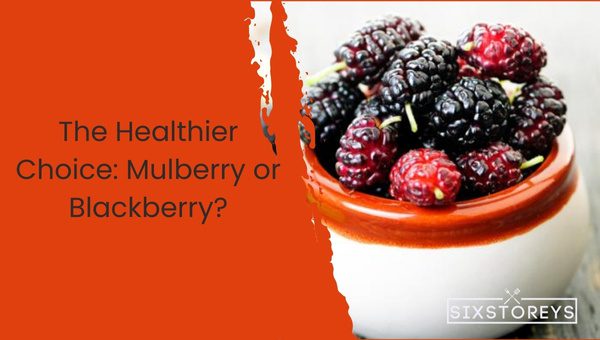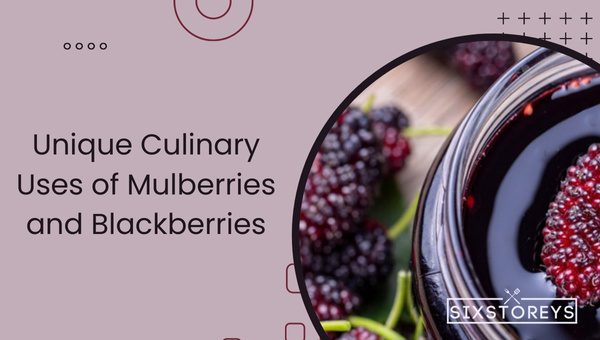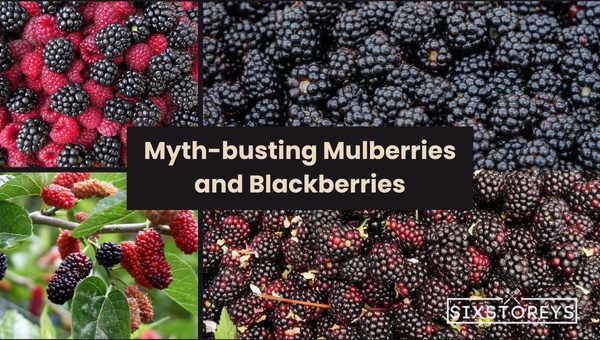Mulberry Vs Blackberry: Which is Worth the Hype?
In the wide world of fruits, the battle of "Mulberry Vs Blackberry" stands out as a real heavyweight contest. Both berries pack their own powerful punch when it comes to flavor and nutritional value, and yet, they're often mistaken for one another or overlooked completely. But let's clear the confusion, it's time these berries got the recognition they rightfully deserve.
In this fruit-forward showdown, we're diving into everything you ever wanted to know about these two berry varieties. We'll dissect their flavors, debunk myths, and even delve into their health benefits. Whether you're a culinary enthusiast, a health-conscious eater, or just someone who loves a good berry, you're bound to discover something new. So, buckle up and get ready for a delightful, delicious journey through the world of mulberries and blackberries. Let the fruity face-off begin!
Also Read: Are Blackberries Acidic or Alkaline?
Article Includes
Blackberries Vs Mulberries: A Nutritional Rundown [Chart]
![Mulberry Vs Blackberry: Which is Worth the Hype? 1 Blackberries Vs Mulberries: A Nutritional Rundown [Chart]](https://www.sixstoreys.com/wp-content/uploads/2023/08/Blackberries-Vs-Mulberries_-A-Nutritional-Rundown-Chart.jpg)
As much as blackberries and mulberries might seem similar, they each have their own unique nutritional profiles. I've put together a detailed chart to shed some light on the subtle differences and similarities between these two powerhouse fruits.
| Blackberries (1 cup) | Mulberries (1 cup) | |
| Calories | 62 | 60 |
| Protein | 2g | 2g |
| Fat | 1g | 0g |
| Carbohydrates | 14g | 14g |
| Fiber | 8g | 2g |
| Sugar | 7g | 11g |
| Vitamin C | 6% of the daily value | 2% of the daily value |
| Vitamin A | 85% of the daily value | 2% of daily value |
| Calcium | 42mg | 55mg |
| Iron | 0.9mg | 1.7mg |
Dissecting the Chart
The above chart indicates that blackberries and mulberries share similar calorie, protein, fat, and carbohydrate content. However, mulberries are far ahead of blackberries when it comes to Vitamin C, supplying a whopping 85% of your daily value in just one cup, compared to blackberries at 50%.
On the other hand, blackberries outshine mulberries in terms of fiber, boasting 8 grams per cup versus mulberries' slender 2 grams. Quality fiber is essential to a healthy diet, assisting with digestion and even helping to control weight by making you feel full faster.
When it comes to sugar, mulberries hold the higher number, packing in 11 grams per cup as opposed to blackberries' 7 grams. It's an important consideration depending on your dietary needs, especially for diabetics or those trying to control sugar intake.
As far as calcium and iron go, both fruits are valuable sources, with mulberries slightly edging out blackberries in both categories.
The takeaway here is that both fruits offer a delightful array of beneficial nutrients. Despite their differences, both blackberries and mulberries can make a powerful, healthy addition to your daily diet. Each fruit champions its own unique set of benefits which, altogether, impacts positively on one's health. Picking a winner might be a subjective call, depending more on personal dietary needs and taste preferences. But one thing's for sure: you can't go wrong adding either of these berries to your menu.
Understanding the Major Differences Between Mulberry and Blackberry
Before we dive into the specifics, let's first establish that mulberries and blackberries, despite their similar names and shared classification as fruits, are actually quite distinct from each other. These differences can be seen in their appearance, taste, nutritional makeup, and even their cultivation process. Let’s delve a little deeper to understand these differences clearly.
Appearance and Structure
Mulberries are small, plump berries that typically range in color from deep, inky black to a vibrant shade of red or white, based on variety. These berries, when fully ripened, have a constantly changing hue that plays between the shades of black, deep purple and red. They're slightly elongated, with an overall structure that's a bit reminiscent of a tiny log, and grow directly off of branches of their parent Mulberry tree.
On the other hand, Blackberries are more uniform in color – displaying a consistent deep, dark black or purple color when ripe. The berry itself possesses a round shape and is composed of clusters of tiny drupelets, which make up the aggregate fruit. Unlike Mulberries, Blackberries grow on thorny bushes rather than large trees.
Taste Profile
The flavor of Mulberries is often described as mildly sweet, with subtle notes of honey. Their sweetness intensifies as they ripen, with fully mature berries sometimes described as having a flavor somewhat resembling that of dried figs or raisins. These beauties also pack a touch of tartness, providing a balanced flavor that is both refreshing and satisfying.
In contrast, Blackberries have a more robust flavor – a blend of sweet and tart, often compared to the taste of raspberries but with a deeper, more intense profile. Depending on ripeness, the tangy characteristic might overshadow the sweet, resulting in a fruit that has a sharp, almost wine-like flavor.
Nutritional Composition
While both Mulberries and Blackberries offer a good dose of health-boosting nutrients, there are some notable differences. Mulberries are especially rich in Vitamin C, iron, and contain a significant amount of dietary fiber. These berries also contain resveratrol, a powerful antioxidant often associated with health benefits like anti-aging and cancer prevention.
Blackberries, however, contain a higher level of certain nutrients like Vitamin K, manganese, and also deliver a hearty dose of fiber. They also boast a high total antioxidant capability, partially due to their high anthocyanin content, which gives it its rich, dark color.
The Health Impact [Blackberries Vs Mulberries]
![Mulberry Vs Blackberry: Which is Worth the Hype? 2 The Health Impact [Blackberries Vs Mulberries]](https://www.sixstoreys.com/wp-content/smush-webp/2023/08/The-Health-Impact.jpg.webp)
Both Mulberries and Blackberries have a significant impact on our health, and incorporating them into our regular diets can provide a serious boost to nutrition. Not to forget, their unique taste profiles make them a delightful addition to our meals too!
Impact of Mulberries on Health
Mulberries are a fantastic fruit to add to your diet if you are aiming for a more balanced, nutrition-rich eating regimen. They are packed with Vitamins C and K, iron, potassium, and many more essential nutrients. Therefore, regularly including Mulberries in your diet could help improve your immune system, enhance heart health, reduce the risk of chronic diseases, and even assist in weight management due to their high fiber content.
Further, Mulberries contain a significant amount of antioxidants, which can help combat oxidative stress, a key factor in premature aging and various health disorders. Resveratrol, an antioxidant found in Mulberries, has been associated with several potential health benefits, including reducing inflammation, slowing down aging processes, and potentially reducing the risk of cancer.
Impact of Blackberries on Health
Blackberries are a nutrient powerhouse, boasting impressive amounts of several essential vitamins and minerals. Particularly high in Vitamin C, they help boost the immune system and promote glowing skin. Blackberries also offer a rich supply of Vitamin K, essential for the proper clotting of blood and building strong bones.
On top of that, the high fiber content in Blackberries helps keep the digestive system healthy and can also assist with weight management. Fiber gives feelings of fullness, which can help curb overeating and unhealthy snacking.
The health bonuses of Blackberries don't stop there, though. The dark purple berries are packed with Anthocyanins, potent antioxidants that not only give blackberries their color but also contribute to reducing inflammation, boosting brain health, and potentially protecting against chronic illnesses including heart disease and certain types of cancer.
While Mulberries and Blackberries do share a few similarities, they're also filled with distinct qualities that make them unique in their own way. Depending on your personal preference and nutritional needs, you might find one more appealing than the other. Nevertheless, you really can't go wrong including either (or both!) of these nutrient-packed berries in your diet. After all, each one carries its own set of potential health benefits and irresistible flavor!
The Healthier Choice: Mulberry or Blackberry?

Let's dive right into the heart of the matter. When it comes to deciding between mulberry and blackberry, which reigns supreme in the realm of health?
Firstly, both fruits have their own unique health benefits, rich in nutrients, and versatile in their application. However, if we dive into the details, each has its unique health impacts.
Nutrient Content
Mulberries are rich in vitamin C, Iron, and vitamin K1. They're also an impressive source of dietary fiber, antioxidants, and a robust quantity of resveratrol, a powerful and beneficial compound rarely found in such high quantities in other fruits. They contain significant levels of protein for a fruit.
Blackberries, on the other hand, are packed full of vitamin C, vitamin K, and manganese. They also offer a decent amount of fiber, and they too are dense with antioxidants. Blackberries contain more overall vitamins and minerals than mulberries, but less protein and iron.
Health Impact
While both fruits are low in calories and high in antioxidants, mulberries stand out for their high resveratrol content. This antioxidant has been linked to improved heart health and decreased cancer risk. Moreover, the exceptional iron content in mulberries can assist in boosting the immune system and supporting overall well-being.
Blackberries tout their own health benefits; their rich fiber content promotes better digestion and their vitamin K content promotes bone health. Antioxidants in blackberries aid in fighting off harmful free radicals, improving brain health and skin health.
When comparing the two, both have amazing health benefits. However, if we have to crown a winner, we'd tip the scales slightly towards mulberries due largely to their high resveratrol and iron content, although the choice might depend on your specific dietary needs and health goals.
Can Mulberries Stand in for Blackberries, and Vice Versa?

The short answer is - yes, in most cases, you can. But let's delve into this a bit more.
Flavor and Texture
Mulberries are generally milder in flavor and a little less tart than blackberries. They have a unique sweetness, almost like honey, and their texture is somewhat chewy. Blackberries, on the other hand, have a good balance of sweet and tart, with their flavor slightly reminiscent of raspberries. Their texture is a bit more robust and crunchy due to their seeds.
In most recipes where the texture and exact flavor isn't crucial, you could feasibly swap these two berries. Things like smoothies, muffins, or fruit salsas would work well with either berry.
Cooking Applications
In cooking applications where the berry's look is important, you might want to stick to the berry your recipe calls for. Blackberries can hold their shape better when cooked, making them ideal for pies or tarts where you want the fruit to stay intact. Mulberries, on the other hand, tend to break down more when cooked, which can make them a fantastic choice for sauces, jam, or blend into smoothies.
Do remember, the main aim is to experiment and enjoy. The mulberry and the blackberry, each with their unique flavors and textures, offer us an array of possibilities in the kitchen. Whether you choose to swap them or keep them in their own lanes is a matter of personal choice, recipe requirement, and availability.
Twinning Berries: Similarities Between Mulberry and Blackberry
When you take first glance at mulberries and blackberries, you might raise an eyebrow at their striking resemblance. The fact is, these two fruits share more than a few similarities, ranging from their appearance to their growth habit and even their culinary applications.
Shared Appearance
Visually, both mulberries and blackberries showcase a deep, almost mystical purple color when ripe and a rubescent pink color when slightly immature. They possess an irregular round shape comprising small, round drupelets that form an adorable cluster. This appearance similarity is probably the main cause of confusion between these two berries.
Growth Habit
When it comes to their growth habits, a clear similarity is evident. Both fruits stem from a plant classified as a bramble, which is a term used for any impenetrable scrub growing wild, including in the hedges. Both bramble fruits have a penchant for growing in the wild and are capable of resisting various weather conditions.
Culinary Usage
Blackberries and mulberries share some common grounds in the culinary department too. Both of them work effortlessly into sweet and savory dishes, make delightful additions to salads, beverages, and desserts, and can be turned into preserves or jams. Moreover, due to their high pectin content, they're excellent for making pies and tarts, as they thicken naturally during cooking.
Nutritional Similarities
In addition to their looks and uses, blackberries and mulberries share nutritional profiles that are very similar. They're both excellent sources of Vitamin C and are rich in antioxidants, crucial for combating oxidative stress and inflammation. Furthermore, they both have high fiber content, helping with digestion and promoting heart health.
Unique Culinary Uses of Mulberries and Blackberries

In the world of gastronomy, mulberries and blackberries bring a unique flavor profile to the table. While they can be enjoyed fresh, these versatile berries can truly shine when incorporated into interesting recipes and pairings. So, let's delve into some of the unique ways these berries can be used.
Cooking with Mulberries
With its sweet, gentle flavor and soft texture, mulberry can work magic in numerous culinary creations. One excellent recipe is the traditional Mulberry Pie. The berries are draped in a classic pastry crust, baked until perfectly brown, and served with a dollop of cream for a delightful dessert.
Mulberries can also make an exotic twist to the usual BBQ sauce. Try a homemade Mulberry BBQ Sauce by adding some pureed mulberries to your regular BBQ sauce mixture. The sweetness will complement the heat of the sauce beautifully.
If you enjoy wine, you might be interested to know that in some parts of the world, notably Øland in Sweden, a unique White Mulberry Wine is fermented, which carries the distinctive sweetness of the berries.
Culinary Adventures with Blackberries
Blackberries are also a versatile addition to your culinary repertoire. One standout dish is the traditional Blackberry Cobbler, this American classic dessert, with its sweet-tart berries and crusty topping, is a favorite come blackberry season.
A beautiful accompaniment with meat, a Blackberry Sauce can elevate your pork chops or steak. Combine blackberries, orange juice, sugar, and some spices in a pot, and reduce it down to a thick sauce. This will add a sweet, tart, fruity element to your savory dish, providing a balanced flavor profile.
Blackberry Sage Infused Water is another unique use. It's a refreshing and healthy beverage made by infusing fresh sage leaves and ripe blackberries in water. The combination creates a thirst-quenching drink that's perfect for summer.
To wrap it up, whether you have a sweet tooth or enjoy savory meals, experimenting with these soft fruits, blackberry and mulberry will provide delightful results! So, don’t stick to the conventional, explore the unexplored, and you will be surprised at how entertaining and rewarding your culinary journey can be!
Myth-busting Mulberries and Blackberries

There seems to be quite a bit of misinformation floating around about the mulberries and blackberries. Let's sift through the rumors and urban legends and get down to the truth.
Mulberries
Myth 1: Mulberries are poisonous
Fact: Every part of the mulberry tree is safe and edible, not just the fruit. You can even make tea from mulberry leaves!
Myth 2: The mulberry tree is invasive and harmful to other plants
Fact: While it's true that mulberry trees can spread through their seeds, they can be kept under control with regular pruning and are not generally harmful to other plants.
Blackberries
Myth 1: Blackberries are also invasive
Fact: Blackberries can be vigorous growers, but with regular pruning and attention, they can be kept in bounds. It's always a good idea to plant them where their spreading habit won't be a problem.
Myth 2: Blackberries are bitter
Fact: When fully ripe, blackberries are sweet and delicious. If tasted too early, while still red or partly black, they can be sour and slightly bitter.
It's time we appreciate these berries for what they truly are - delicious, versatile and bountiful gifts from Mother Nature. Whether you decide to grow your own or just eat them fresh, mulberries and blackberries have a lot to offer. So go on, indulge yourself and enjoy your very own home-grown berries or simply enjoy them fresh from the market, knowing a little more about where they come from.
Flavor Pairing: Complementary Foods for Mulberries and Blackberries
Both mulberries and blackberries boast their own distinguished flavors, making them strong key players in a variety of dishes. For anyone looking to give their meals an upgrade, understanding which flavors pair well with these berries can amplify the dining experience.
Mulberries: Savor the Sweetness
Mulberries are sweet yet mild – a combination that goes hand in hand with various flavors. I find that these fruits pair exceptionally well with dairy products. Imagine a creamy mulberry yogurt for breakfast, or a sophisticated mulberry and brie cheese tart for a dinner party.
In Asian cuisine, mulberries are often used in main dishes. They work brilliantly with duck and game meats, providing a sweet contrast to the rich, savory flavors.
For a refreshing summer treat, consider a mulberry and mint salad or muddle them into a thirst-quenching glass of mojito. If desserts are your thing, mulberries and chocolate, particularly dark chocolate, create an irreplaceable harmony in cakes or simply drizzled over the fresh berries.
To illustrate the flavor pairing, here's a simple table:
| Mulberries | Pair with |
| Dairy products | Cheese, Yogurt, Cream |
| Meat | Duck, Game Meat |
| Herbs | Mint |
| Desserts | Dark Chocolate |
Blackberries: Blend with the Bold
Blackberries carry a more robust flavor, a blend of sweet and tart, making them a favorite for cocktails and desserts. They marry well with a variety of fruits like apples, pears, peaches, and apricots, and a blackberry and mixed fruit pie is quintessentially summer.
Their strong flavor stands up to potent spices like vanilla, cardamom, and star anise. In savory dishes, blackberries can be transformed into a delicious glaze for lamb, pork, or beef, adding a sweet-tart twist.
Cheeses, particularly goat cheese, blue cheese and camembert, complement the unique flavor of blackberries. A handful of blackberries can be a stunning addition to a cheeseboard or a goat cheese salad. And let's not forget the classic pairing of blackberries with dark chocolate for a decadent dessert treat.
The flavor pairing can be better visualized using the following table:
| Blackberries | Pair with |
| Fruits | Apple, Pear, Peach, Apricots |
| Spices | Vanilla, Cardamom, Star Anise |
| Meats | Lamb, Pork, Beef |
| Dairy | Goat cheese, Blue cheese, Camembert |
| Desserts | Dark Chocolate |
Also Read: Is Dill the Same as Dill Weed? Discover the Real Difference
Frequently Asked Questions
What are Mulberries?
Mulberries are sweet fruits that grow on deciduous trees. They come in various colors including white, pink, and black, with a taste profile similar to figs or dried raisins.
What are Blackberries?
Blackberries are small, juicy fruits that grow on perennial plants. They are commonly found around the world, known for their deep black color and sweet-tart flavor.
How do Mulberry and Blackberry Taste?
While both are sweet, Blackberries have a more tart flavor with a hint of sourness, whereas Mulberries are usually sweeter with a mild, fig-like flavor.
Can Mulberries be Substituted for Blackberries in Recipes?
It depends on the recipe. In most cases, they can be used interchangeably, but the sweetness of Mulberries might alter the taste in some recipes that call for the tartness of Blackberries.
Are Mulberries Healthier than Blackberries?
Both fruits offer substantial health benefits and are packed with antioxidants. However, nutritional values may vary, so be sure to consider your personal dietary needs.
When is the Best Time to Buy Mulberries and Blackberries?
Mulberries ripen in late spring to early summer while Blackberries typically ripen in mid to late summer. Therefore, availability may vary depending on your location.
Can I Grow Mulberries and Blackberries in my Backyard?
Yes, both Mulberries and Blackberries can be grown successfully in a backyard garden. They require different care, so be sure to research proper cultivation methods for both.
Do Mulberries and Blackberries Look Similar?
Despite some similarities, they are generally easy to tell apart. Mulberries are elongated while Blackberries are rounded and segmented. Plus, their colors may also differ.
Conclusion
Evidently, the journey through the fruity world of Mulberries and Blackberries has been a delightful revelation. Both fruits are packed with immense flavor, vital nutrition, and boast significant health benefits. Crucially, understanding the distinct characteristics of each helps to unlock their full potential. Whether used as sweet additions to your culinary delights or leveraged for their health boosters, these berries make a wonderful inclusion in your diet. Keep experimenting, keep tasting, and keep enjoying these berrylicious treats. Soon, your favorite fruit might just swing between Mulberries and Blackberries.
Remember, the Mulberry Vs Blackberry debate isn't about replacing one with the other, but appreciating the unique offerings of each!
